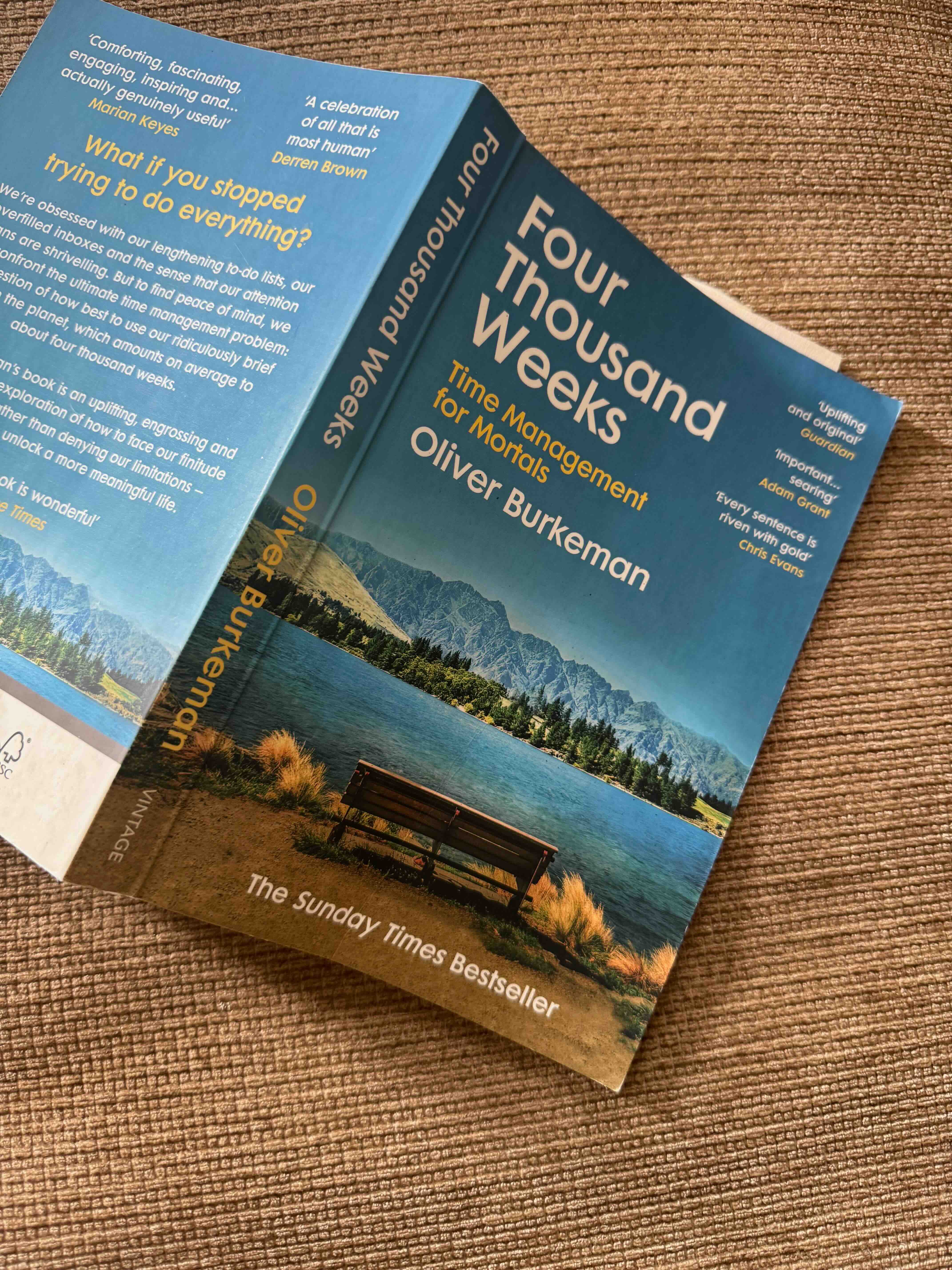Four Thousand Weeks
02 Dec 2024

For me, this book was like Carl Newports Slow Productivity meets Eckhardt Tolle’s Power of Now.
My views and a couple of changes I have incorporated follow this summary, themes and takeaways from ChatGPT (it does an amazing job of summarising) and I am going to use this post as a notes of sort for myself to come back to.
ChatGPT Summary
Four Thousand Weeks: Time Management for Mortals by Oliver Burkeman is a thought-provoking book that challenges traditional approaches to time management. Instead of focusing on productivity hacks and ways to optimize every moment, Burkeman explores the philosophical and psychological aspects of time, encouraging readers to embrace their limitations and focus on what truly matters. Here’s a summary of its key themes:
The average human lifespan is roughly 4,000 weeks, which underscores the brevity of life. Burkeman argues that much of modern time management is misguided because it aims to fit everything into this finite timeframe. Instead, he encourages readers to confront their mortality and make intentional choices about how they spend their limited time.
Key Themes
1. Acceptance of Finite Time
• We can’t do everything, and that’s okay. By accepting our limits, we can focus on the tasks, relationships, and goals that truly matter.
• The relentless pursuit of efficiency often leads to a sense of dissatisfaction because there’s always more to do.
2. The Illusion of Control
• Time management systems often create the illusion that we can master time, but life is inherently unpredictable.
• Embracing uncertainty and letting go of perfectionism can lead to a more fulfilling life.
3. Focus on the Present
• Instead of constantly chasing future goals, Burkeman advocates for being fully present in the moment.
• Meaningful experiences and relationships happen in the here and now, not in a perfectly planned future.
4. The Tyranny of Choice
• Modern life offers an overwhelming array of options, leading to decision fatigue and fear of missing out (FOMO).
• By deliberately narrowing our focus, we can deepen our engagement with the things that matter most.
5. Prioritize What Matters
• Instead of working through an endless to-do list, identify a few key priorities and invest your time in those.
• Saying “no” to less important commitments is essential to make space for what truly aligns with your values.
6. The Joy of Finishing Less
• Not everything has to be completed or perfected. Sometimes, leaving things undone or half-finished is a sign of prioritizing wisely.
Practical Takeaways
• Decide What to Neglect: Let go of the myth that you can “do it all.” Choose what to focus on and consciously let go of other tasks or opportunities.
• Limit Your Tasks: Work on fewer projects at a time and give them your full attention.
• Embrace “Slow Productivity”: Quality over quantity. Deep, meaningful work takes precedence over churning out more output.
• Learn to Wait: Good things often require patience, and immediate gratification can undermine long-term fulfillment.
Overall Message
Burkeman’s book is both liberating and sobering. It shifts the focus from squeezing maximum productivity out of life to living meaningfully within the constraints of our limited time. By embracing our finitude, we can live with more clarity, purpose, and joy.
My thoughts...
Having been in the tech/startup world for the last 1.5 decades, I’ve spent a significant amount of time exploring productivity tools and techniques. Each week, I’d try out a new tool, often getting distracted from my actual work under the illusion of becoming "more productive" and trying to fit all my tasks within a given day. Four Thousand Weeks was a true eye-opener, challenging the idea that doing more and maximizing our time (as if we’re in control of it) leads to a better life.
Even as I write this post, part of my mind is urging me to hurry up and finish it within the next 30 minutes so I can move on to the other tasks on my plate today—like checking emails. This means I’m writing with a future goal in mind, rather than fully immersing myself in the act of writing and enjoying the process. I’m missing being in the “zone” - that timeless state where creativity flows freely. My thoughts are already racing ahead to the next thing.
One app change I’ve made after reading this book is giving up Superhuman and switching back to simple Apple Mail. I realized I don’t need an email client to give me "superpowers." I no longer feel compelled to triage emails at lightning speed or reach inbox zero at the end of every day. I’ve let go of the need to go through my inbox as quickly as possible. Instead, I’ve chosen to take my time, go through emails at my own pace, and accept that not reaching inbox zero is perfectly fine.
This book is as liberating as it gets. It’s a powerful reminder that we don’t need to check off everything on our to-do lists to live a meaningful life.
